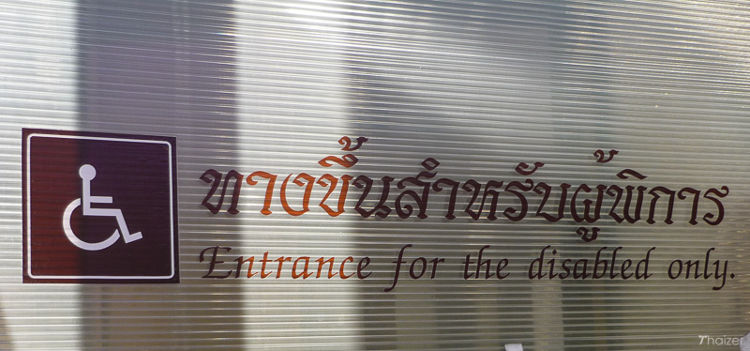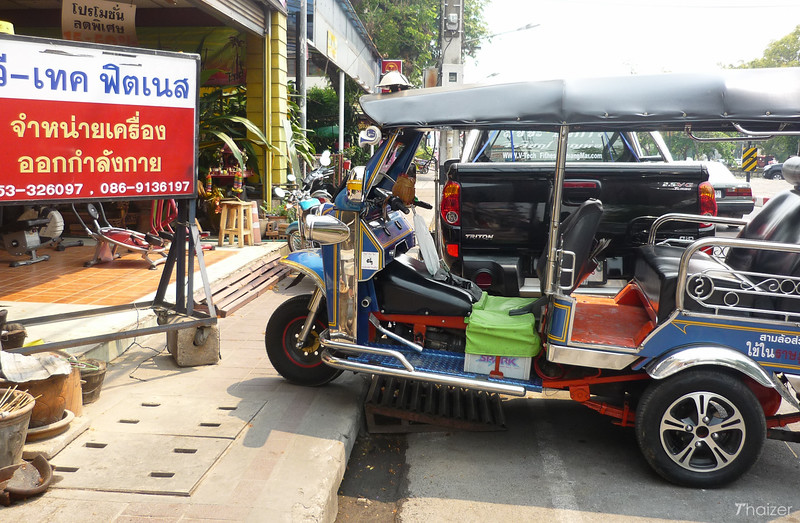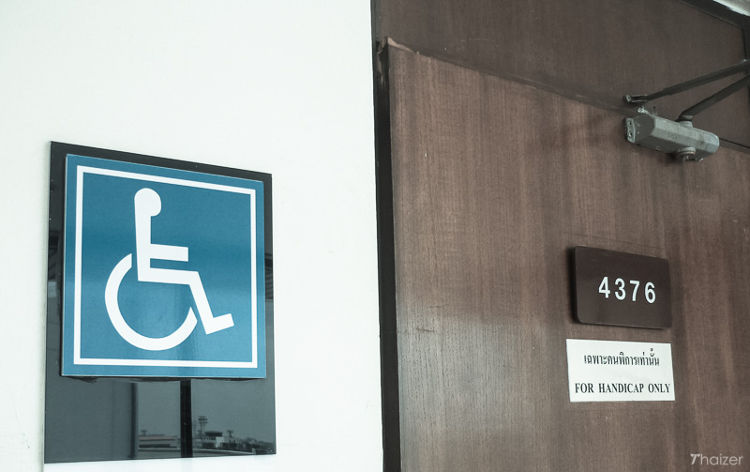Facilities and access for disabled travellers in Thailand still lag a long way behind countries like America, Australia and the United Kingdom. That doesn’t mean that if you have a health condition or impairment you can’t still enjoy Thailand, but you will need to plan ahead. The links at the end of this article provide some personal experiences of disabled travellers who have had fantastic trips to Thailand so don’t be put off if you’re thinking of visiting but are worried it might be too difficult. Not all tourist attractions have ramps or are easily accessible by wheelchair but, generally speaking, Thai people will help you out if you politely ask for assistance. Language barriers can sometimes create as many difficulties as physical barriers so it’s worth considering hiring an officially registered tour guide for at least part of your trip. It will cost you more money than exploring independently, but could save you from potential problems. Having a Thai speaker with you makes it much easier to gain access to temples and other attractions that may not initially appear to be suitable for somebody with a mobility aid.

If you are going to require assistance, always advise the airline at the time of booking. At all airports in Thailand, staff will be able to help disabled passengers if they need assistance including help at immigration and baggage collection if required.
At the main international airport in Bangkok (Suvarnabhumi) facilities for disabled travellers are reasonably good. Wheelchair and electric carts are available, there are access lifts to all levels and the disabled toilet facilities are clean and well-maintained. Most international flights arriving or departing Bangkok Suvarnabhumi use air-bridges for passengers to get on and off the plane. That isn’t always the case with domestic flights at Bangkok Don Muang or some other regional airports in Thailand where steps may be used. Advise the airline at time of booking if you use a wheelchair or need assistance.
The airport rail link from Bangkok Suvarnabhumi airport has very good facilities for disabled travellers. The connecting elevator is spacious for wheelchairs and also includes braille buttons and voice announcements to indicate which floor or level the elevator has reached. Ticket machines and access gates are wheelchair friendly and on the train itself there is an area allocated especially for disabled passengers. Disabled toilet facilities are available at Suvarnabhumi and Makkasan station.
More details on routes and facilities
Many taxis in Bangkok run on natural gas with the gas tank located in the boots (trunk) of the vehicle. This means there is limited space for luggage so a folded wheelchair won’t always fit into the usual sedan-sized cabs. With the larger taxis it shouldn’t be a problem.
The Bangkok Metropolitan Authority (BMA) have recently launched a new taxi service to help disabled people in the city. The initial launch of the service seems to be mainly aimed at locals rather than tourists. At the moment, there are ten specially adapted taxis taking part in the scheme with room for two wheelchairs and two passengers. The service is available from 06.00 to midnight with a 30 Baht booking fee on top of the standard meter fare.
Website (Thai language)
Hiring a taxi or a car with driver for a few hours or a day can be a good way to get around and save a lot of time and frustration. Wherever you are in Thailand you should easily be able to find a tour office who can recommend a local driver with a suitable vehicle. Alternatively, ask for advice at your hotel.
The Skytrain (BTS) can be a great way to get around Bangkok, but not all stations have lifts/elevators. Check your route beforehand on the BTS website. A the time of writing there are 16 Skytrain stations which do have lifts/elevators. From a tourist perspective, some of the most convenient are: Asoke, Chong Nonsi, Mo Chit, On Nut and Siam. See the link below for full list of stations.
Bangkok Skytrain facilities
For any questions and advice on travel on the BTS, helpful Tourist Information Centres are located at Saphan Taksin, Phaya Thai and Siam stations.
The modern underground train system known as MRT, has very good facilities for disabled travellers. Every metro station in Bangkok has lifts and wheelchair access.
Bangkok metro guide
Away from Bangkok and main tourists resorts, you will find that the main form of public transport is a choice of songthaews, samlors or tuk-tuks. These can be hired as private taxis for a few hours or a full day. You’ll need to negotiate a price, but this is still a cost-effective and convenient way to get around or do some sight-seeing.
Trains in Thailand present another challenge for wheelchair users. There are a limited number of trains and carriages which provide access for wheelchairs and many provincial stations have no facilities whatsoever for disabled travellers. There have been attempts to try to improve the situation, but at the moment it is much easier and less stressful for wheelchair users in Thailand to either take a domestic flight or travel by road.
Boat services in Thailand present problems for even the most determined and adventurous of disabled visitors. Taxi boats in Bangkok are usually crowded and there isn’t much time available to get on or off the boat. If you want to explore the khlongs (canals) of Bangkok, it’s possible to hire your own private longtail boat, but you will need to be accompanied by somebody who can assist you getting in and out of the boat if that’s required. Elsewhere in Thailand, longtail boats can be boarded at a more leisurely pace and provided you have somebody with you to assist if needed, they can be a good way to explore the beaches and islands. Some of the ferry boats operating in Thailand can be difficult to board for disabled travellers with steps sometimes used instead of ramps.
Many budget hotels and guest houses in Thailand don’t have lifts/elevators, but most of the mid-range and modern hotels and resorts are well-equipped for disabled guests. Smaller boutique hotels that might not have all the facilities you require can often make up for that with attentive personal service and assistance. Take a look at the hotel’s website and if you aren’t sure on anything email them your questions. Always advise the hotel in advance if you have any particular requirements.
Some of the disabled facilities at tourists attractions in Thailand are excellent. Some are non-existent. It can be a bit of pot-luck for disabled travellers when it comes to ease of access. You’ll find that ramps and facilities are in place in some locations and not others. Even if you’re not the sort of traveller that would normally hire a local tour guide or driver, it’s something worth giving serious consideration to in Thailand.
I have Thai friends who joke that the only people they see walking in Thailand are foreigners. I like to walk in Thailand, but it does present its own unique set of challenges for everybody. High kerbs and uneven pavements (sidewalks) are just one part of the equation. Expect to navigate your way around diners having lunch, motorbikes taking short-cuts, parked vehicles and sleeping dogs. Add in some random telephone booths or signs blocking the path and you have an idea of what the average Thai footpath looks like. Not ideal if you are visually impaired or use a wheelchair, but definitely a very Thai experience. You have been warned!

Just about every Thai town, city and resort has at least one modern shopping mall. Bangkok has dozens. If you’re out and about exploring, these shopping centres are often the best place to go to if you need a disabled toilet. The air-conditioned malls also make for a pleasant respite from the outdoor heat and provide the opportunity to get some refreshments and plan the rest of your day in comfort.
At the other end of the scale to the modern malls are the local night markets (talat yen). These outdoor venues are a great place to try local food. The atmosphere is relaxed and the prices are low. The only real downside for disabled travellers is there aren’t always decent toilet facilities nearby.
Thai translations into English often use words and phrases that raise eyebrows so don’t be surprised or offended by anything you see or hear! I’ve seen disabled facilities in Thailand described as ‘for handicap only’ or ‘for the infirm’. Political correctness as a concept doesn’t really exist in Thailand and you can expect to experience some culture shock if you are a first-time visitor.

As mentioned previously, Thai people are generally helpful and polite. They can also be quite shy. If you need assistance but are having problems with the language barrier, don’t underestimate the power of the smile. A smile in Thailand, together with being polite goes a long way in setting the right tone. There are times when Thailand can be frustrating, but always try to be calm and polite.
Bringing prescribed drugs into Thailand
Tour company specialising in wheelchair tours of Thailand:
Wheelchair tours
Personal experiences of Thailand from Arik Vamosh, a T-10 paraplegic:
Wheelchair accessible Thailand
Brian Jensen writes about his time in Thailand with some practical advice and tips for disabled visitors going to Bangkok or Hua Hin:
Thailand holiday travel guide for wheelchair users
Article written by Leah in 2012 detailing her experiences in Bangkok, Ayutthaya, Hua Hin and Pattaya. The writer has type 2 SMA (spinal muscular atrophy):
My incredible trip through Thailand via Oman
Experiences of southern Thailand from Justin Frishberg, a tetraplegic wheelchair user. Justin tells his personal account of time spent in Krabi which included travel in longtail boats and scuba diving:
Accessible holidays in Krabi
Informative article written by Judith Geppert detailing her experience in Thailand using a wheelchair. This was written in 2005 so it’s not right up to date, but it’s still an interesting read if you are looking for first hand insights and opinions:
Thailand holiday adventure
Advice from the Tourism Authority of Thailand:
Facilities for disabled travellers